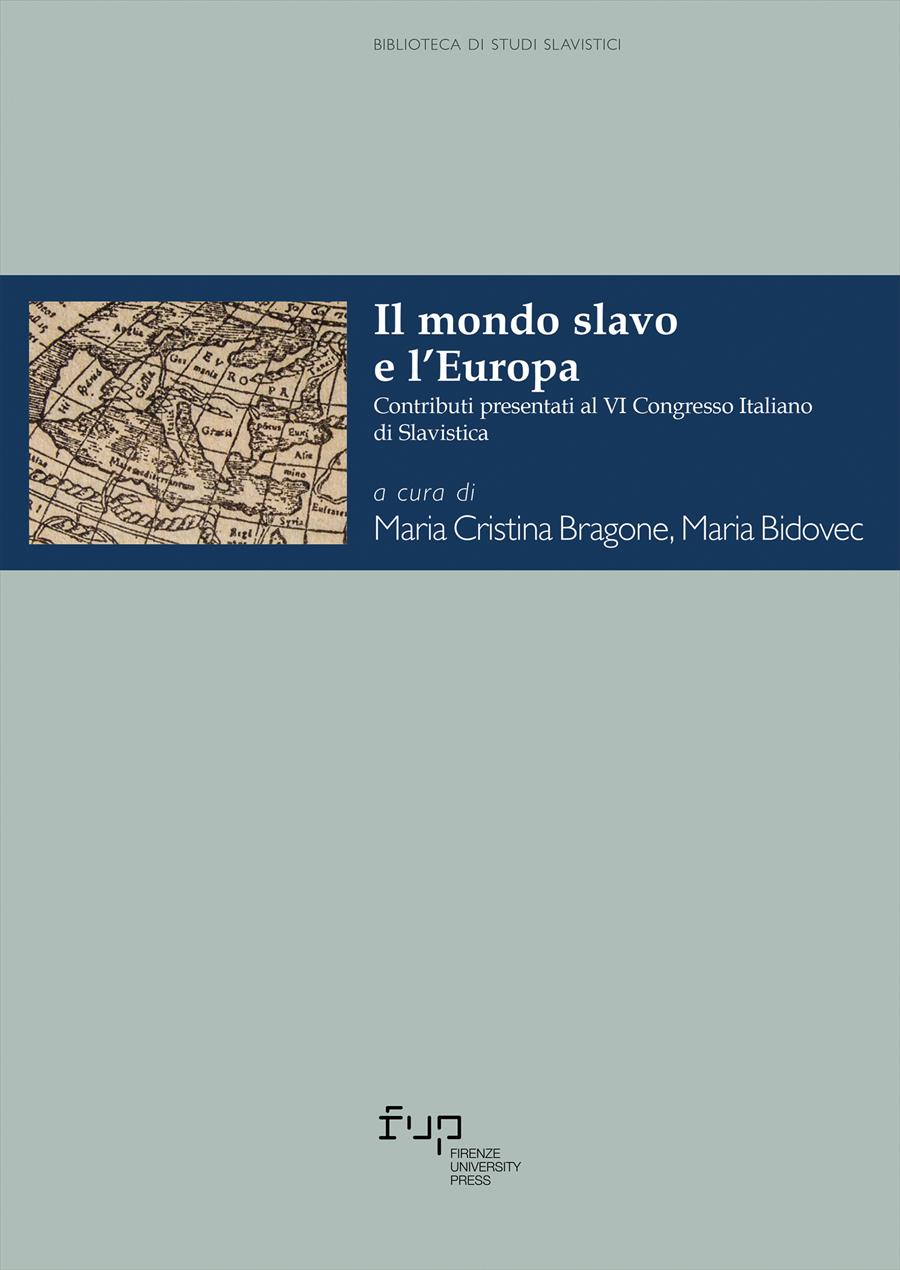- Il mondo slavo e l’Europa
- Edited by Maria Cristina Bragone, Maria Bidovec
Nietzsche e l’immaginazione culturale in Russia all’inizio del XX secolo. Un caso di studio: Dmitrij Merežkovskij
- Nadia Caprioglio
- © 2019 Author(s) |
- CC BY 4.0
- DOI: 10.36253/978-88-6453-910-2.28
In the decades prior to the Revolution of 1917, the Russian intelligencija was strongly influenced by Western European intellectuals, including Friedrich Nietzsche. Nietzsche was one of the European philosophers who played a prominent role in shaping Russian perceptions of reality in this period, although his thought was interpreted by Russians in contrasing ways. The article examines the case of Dmitrij Merežkovskij, reassessing the extent of Nietzsche’s influence on his oeuvre. In our view, Nietzsche did not only influence Merežkovskij’s early poetry, where aesthetic and anti-Christian views prevail, but also contributed to the sensual and individualist nature of his later prose.
- Keywords:
- Dmitrij Merežkovskij,
- Nietzsche,
- Russian Neo-Christianity,
- bogoiskatel’stvo,
University of Turin, Italy - ORCID: 0000-0002-7545-4272
- Averincev, S. 1975. “Poezija Vjačeslava Ivanova”. Voprosy Literatury, 8: 145-192.
- Ballanche, P.-S. 1833. “Palingénésie sociale: prolégomènes”, in P.-S. Ballanche. Oeuvres, IV. Paris.
- Belyj, A. 1910. Lug zelënyj. Moskva.
- Berdjaev, N. 1916. Smysl’ tvorčestva. Opyt opravdanija čeloveka. Moskva.
- Bloom, H. 1973. The anxiety of influence. Oxford (trad. it. a cura di M. Diacono. L’angoscia dell’influenza. Una teoria della poesia. Milano).
- Caprioglio, N. 1987. “Sulla poesia di Dmitrij Sergeevič Merezkovskij”. Humanitas, 6: 900-911.
- Caprioglio, N. 1993. “Dmitrij S. Merežkovskij. Fino alla fine del mondo”. Rivista di estetica, XXXII.40-41: 144-161.
- Clowes, E.D. 1988. The Revolution of Moral Consciousness. DeKalb (IL).
- Jauss, H.R. 1970. Literaturgeschichte als Provocation der Literaturwissenschaft. Konstanz (trad. it. a cura di A. Varvaro. Perché la storia della letteratura?. Napoli 2001).
- L’vov-Rogačevskij, V. 1920. Očerki po istorii novejšej russkoj literatury. 1881-1919. Moskva.
- Merežkovskij, D. 1900. “L. Tolstoj i Dostoevskij. Vstuplenie”. Mir iskusstva, 1-2: 1-7 (trad. it. di A. Polledro- Tolstoj e Dostoevskij. Bari 1947).
- Merežkovskij, D. 1914. “Christos i Antichrist. Trilogija”, in D. Merežkovskij. Polnoe sobranie sočinenij v 24 tomach, I-III. Moskva (trad. it. di N. Romanowsky. La morte degli dei. Il romanzo di Giuliano l’Apostata, voll. I-II. Milano 1901; La resurrezion
- Merežkovskij, D. 1914. “M.Ju. Lermontov. Poet sverchčelovečestva”, in D. Merežkovskij. Polnoe sobranie sočinenij v 24 tomach, XVI. Moskva (ora in V tichom omute. Stat’i i issledovanija raznych let. Moskva 1991: 378-415).
- Merežkovskij, D. 1914. “Ne mir no meč’”, in D. Merežkovskij. Polnoe sobranie sočinenij v 24 tomach, XIII. Moskva.
- Merežkovskij, D. 1914. “O pričinach upadka i o novych tečenijach sovremennoj russkoj literatury”, in D. Merežkovskij. Polnoe sobranie sočinenij v 24 tomach, XVIII. Moskva: 175-266.
- Merežkovskij, D. 1914. “Večnye sputniki. Portrety iz vsemirnoj literatury. Puškin”, in D. Merežkovskij. Polnoe sobranie sočinenij v 24 tomach, XVIII. Moskva: 89-172 (ora in V tichom omute. Stat’i i issledovanija raznych let. Moskva 1991: 146-212).
- Michajlovskij, B. 1965. Tvorčestvo M. Gor’kogo i mirovaja literatura. Moskva.
- Mirza-Avakian, M.L. 1972. “F. Nicše i russkij modernizm”. Vestnik Erevanskogo Universiteta, 3: 92-103.
- Nietzsche, F. 1883. Also sprach Zarathustra. Chemnitz (trad. it. di R. Giani. Così parlò Zarathustra. Milano 1915).
- Nietzsche, F. 1886. Jenseits von Gut und Böse. Leipzig (trad. it. di G. Quattrocchi. Al di là del bene e del male. Milano 2006).
- Nietzsche, F. 1887. Zur Genealogie der Moral. Leipzig (trad. it. di F. Masini. Genealogia della morale. Milano 1968).
- Nietzsche, F. 1889. Götzen-Dämmerung. Leipzig (trad. it. di Anonimo. Il crepuscolo degli Idoli. Milano 1924).
- Rosenblatt, L. 1988. Writing and Reading: The Transactional Theory. Champain, <https://www.ideals.illinois.edu/bitstream/handle/2142/18044/ctrstreadtechrepv01988i00416_opt.pdf> (ultimo accesso: 15.03.19).
- Rosenthal, B.G. 1975. Dmitri Sergeevich Merezhkovsky and the Silver Age: The Development of a Revolutionary Mentality. The Hague.
- Strada, V. 1989. “La letteratura della fine del XIX secolo (1890-1900)”, in E. Ėtkind et al. (a cura di). Storia della letteratura russa, III. Il Novecento. I. Dal decadentismo all’avanguardia. Torino: 5-44.
- Tynjanov, Ju. 1927. “O literaturnoj evoljucii”, in Ju. Tynjanov. Poetika. Istorija literatury, Kino. Moskva: 270-281, <http://philology.ru/literature1/tynyanov-77f.htm> (ultimo accesso: 15.03.19).
- Vengerov, S. 1914. Russkaja literatura XX veka. Moskva.
Chapter Information
Chapter Title
Nietzsche e l’immaginazione culturale in Russia all’inizio del XX secolo. Un caso di studio: Dmitrij Merežkovskij
Authors
Nadia Caprioglio
Language
Italian
DOI
10.36253/978-88-6453-910-2.28
Peer Reviewed
Publication Year
2019
Copyright Information
© 2019 Author(s)
Content License
Metadata License
Bibliographic Information
Book Title
Il mondo slavo e l’Europa
Book Subtitle
Contributi presentati al VI Congresso Italiano di Slavistica (Torino, 28-30 settembre 2016)
Editors
Maria Cristina Bragone, Maria Bidovec
Peer Reviewed
Number of Pages
368
Publication Year
2019
Copyright Information
© 2019 Author(s)
Content License
Metadata License
Publisher Name
Firenze University Press
DOI
10.36253/978-88-6453-910-2
ISBN Print
978-88-6453-909-6
eISBN (pdf)
978-88-6453-910-2
eISBN (epub)
978-88-6453-911-9
eISBN (xml)
978-88-9273-039-7
Series Title
Biblioteca di Studi Slavistici
Series ISSN
2612-7687
Series E-ISSN
2612-7679
